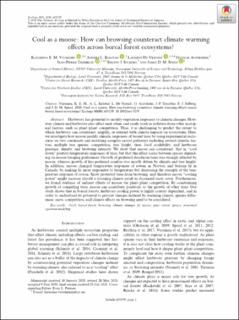Cool as a moose: How can browsing counteract climate warming effects across boreal forest ecosystems?
Vuorinen, Katariina; Kolstad, Anders Lorentzen; De Vriendt, Laurent; Austrheim, Gunnar; Jean-Pierre, Tremblay; Solberg, Erling Johan; Speed, James David Mervyn
Peer reviewed, Journal article
Published version

Åpne
Permanent lenke
https://hdl.handle.net/11250/2680303Utgivelsesdato
2020Metadata
Vis full innførselSamlinger
- Institutt for naturhistorie [1225]
- Publikasjoner fra CRIStin - NTNU [38127]
Originalversjon
10.1002/ecy.3159Sammendrag
Herbivory has potential to modify vegetation responses to climatic changes. However, climate and herbivory also affect each other, and rarely work in isolation from other ecological factors, such as plant–plant competition. Thus, it is challenging to predict the extent to which herbivory can counteract, amplify, or interact with climate impacts on ecosystems. Here, we investigate how moose modify climatic responses of boreal trees by using experimental exclosures on two continents and modeling complex causal pathways including several climatic factors, multiple tree species, competition, tree height, time, food availability, and herbivore presence, density, and browsing intensity. We show that moose can counteract, that is, “cool down” positive temperature responses of trees, but that this effect varies between species depending on moose foraging preferences. Growth of preferred deciduous trees was strongly affected by moose, whereas growth of less preferred conifers was mostly driven by climate and tree height. In addition, moose changed temperature responses of rowan in Norway and balsam fir in Canada, by making fir more responsive to temperature but decreasing the strength of the temperature response of rowan. Snow protected trees from browsing, and therefore moose “cooling power” might increase should a warming climate result in decreased snow cover. Furthermore, we found evidence of indirect effects of moose via plant–plant competition: By constraining growth of competing trees, moose can contribute positively to the growth of other trees. Our study shows that in boreal forests, herbivory cooling power is highly context dependent, and in order to understand its potential to prevent changes induced by warming climate, species differences, snow, competition, and climate effects on browsing need to be considered.
